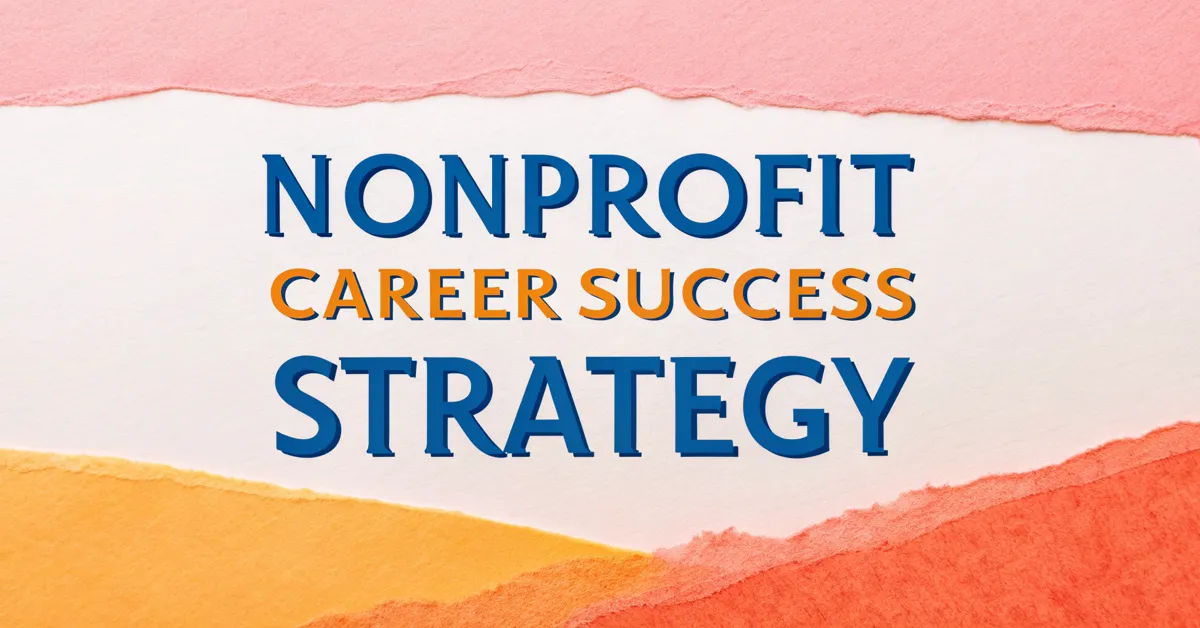Are you drawn to work that makes a difference? Yearning to pour your energy into something bigger than yourself? Then the world of nonprofit work may be calling your name. Many view the nonprofit sector as a place where passion and purpose converge, and the desire to create positive change fuels careers. Yet, landing a fulfilling and impactful role in this field requires more than just good intentions.
This article serves as your guide to navigate the landscape of nonprofit careers. You’ll learn how to strategically position yourself for success in this competitive sector, identifying the right path, developing the necessary skills, and landing a role where you can truly thrive.
Understanding the Landscape of Nonprofit Work
The nonprofit world is vast and varied. Before diving into your job search, it’s helpful to grasp its scope and identify the areas that resonate most with you.
Nonprofits, at their core, are organizations dedicated to serving a public benefit. Unlike for-profit businesses driven by profit, nonprofits reinvest any surplus revenue back into their mission. This mission could range from alleviating poverty and promoting education to protecting the environment and advancing human rights.
The areas of focus within nonprofit work are incredibly diverse. You might find yourself drawn to:
- Human Services: Providing direct assistance to individuals and families in need, addressing issues like homelessness, food insecurity, and domestic violence.
- Education: Working to improve access to quality education for all, whether through direct teaching, curriculum development, or advocacy.
- Environmental Conservation: Protecting natural resources, promoting sustainable practices, and advocating for environmental policies.
- Arts and Culture: Supporting artistic expression, preserving cultural heritage, and making the arts accessible to broader audiences.
- Healthcare: Working to improve health outcomes, promote disease prevention, and expand access to healthcare services.
- International Development: Addressing global challenges like poverty, hunger, and disease, and promoting sustainable development in developing countries.
Within these areas, the types of roles available are just as varied. Nonprofits need professionals in:
- Program Management: Overseeing the design, implementation, and evaluation of nonprofit programs.
- Fundraising and Development: Raising funds to support the organization’s mission through grant writing, individual giving, and special events.
- Communications and Marketing: Spreading awareness of the organization’s work, engaging supporters, and advocating for its cause.
- Finance and Administration: Managing the organization’s finances, ensuring compliance with regulations, and providing administrative support.
- Advocacy and Policy: Working to influence public policy and advocate for the organization’s mission.
The possibilities are vast. The key lies in identifying your passion and aligning it with a role where your skills can make a real difference. To achieve this, take time to reflect on what cause you want to champion. Think about the kind of work environment where you thrive. Do you want to be on the ground or behind the scenes? All these considerations are paramount in finding the right fit for you.
Assessing Your Skills and Interests
Your journey to a successful nonprofit career begins with self-assessment. Taking stock of your existing skills, identifying your areas of interest, and understanding your values will help you narrow your focus and target the right opportunities.
Start by creating a comprehensive inventory of your skills. Think beyond just your professional experience. Consider skills you’ve developed through:
- Education: Academic coursework, research projects, and extracurricular activities.
- Volunteer Work: Hands-on experience in the field, demonstrating your commitment and passion.
- Hobbies and Interests: Skills developed outside of work can often be transferable and valuable in a nonprofit setting.
- Previous Employment: Even if your previous roles weren’t in the nonprofit sector, identify the transferable skills you gained.
Some of the most valuable skills in nonprofit work include:
- Communication: Both written and verbal, the ability to communicate effectively with diverse audiences is essential.
- Project Management: Organizing, planning, and executing projects efficiently and effectively.
- Fundraising: Securing financial resources through grant writing, donor relations, and fundraising campaigns.
- Data Analysis: Collecting, analyzing, and interpreting data to inform decision-making and measure program impact.
- Collaboration: Working effectively with teams, partners, and stakeholders to achieve common goals.
- Adaptability: Being flexible and responsive to changing circumstances and priorities.
Next, explore your interests and passions. What issues are you most passionate about? What kind of work energizes you? Consider your values as well. What principles guide your decisions and actions? Identifying your core values will help you find organizations whose missions align with your own.
Once you have a clear understanding of your skills, interests, and values, you can start to identify the types of nonprofit roles that would be a good fit. This exploration may involve some research into the needs in areas you are passionate about. Reach out to nonprofits doing the work you find inspiring and inquire about their needs. You never know what opportunities might arise simply by making that initial contact.
Building Relevant Experience
While passion is essential, experience is what sets you apart in the competitive nonprofit job market. Even if you’re starting out, there are many ways to gain relevant experience and demonstrate your commitment to the sector.
Volunteer work is one of the most accessible and impactful ways to gain experience. Look for opportunities at organizations whose missions align with your interests. Volunteer roles can provide hands-on experience in various areas, from direct service to fundraising and administrative support.
Internships offer a more structured learning experience and can provide valuable insights into the inner workings of a nonprofit organization. Many nonprofits offer internships to students and recent graduates, providing opportunities to gain experience in specific areas of interest.
Even if you’re currently employed in a different sector, you can seek out opportunities to apply your skills to nonprofit causes. Offer your expertise to local nonprofits on a pro bono basis, or volunteer your time on evenings and weekends.
Consider also taking on leadership roles in community organizations or clubs. These experiences can demonstrate your ability to lead teams, manage projects, and make a positive impact.
When seeking out experience-building opportunities, focus on roles that will help you develop the skills most valued in nonprofit work. Document your accomplishments and quantify your impact whenever possible. This will help you showcase your skills and experience to potential employers.
Crafting a Compelling Resume and Cover Letter
Your resume and cover letter are your first impressions. In a sector driven by purpose, these documents must convey your skills, experience, and passion for the cause.
Tailor your resume to each specific job you’re applying for, highlighting the skills and experience that are most relevant to the position. Use action verbs to describe your accomplishments and quantify your impact whenever possible.
Your cover letter should be more than just a summary of your resume. It should be a compelling narrative that tells your story and connects your skills and experience to the organization’s mission.
Start by researching the organization thoroughly, demonstrating that you understand its mission, values, and programs. Express your passion for the organization’s work and explain why you’re drawn to its mission.
Highlight the skills and experience that make you a strong fit for the position. Provide specific examples of how you’ve used your skills to make a positive impact in the past.
Address any concerns or questions the employer might have, such as a lack of direct nonprofit experience or a career change. Explain why you’re passionate about transitioning to the nonprofit sector and how your skills and experience can be transferable.
Proofread your resume and cover letter carefully to ensure they’re free of errors. Ask a friend or colleague to review them as well, to catch any mistakes you might have missed.
Your resume and cover letter are your opportunity to showcase your unique value proposition and make a compelling case for why you’re the right candidate for the job. Make sure they’re well-crafted, tailored, and error-free.
Networking and Building Connections
In the nonprofit world, who you know can be just as important as what you know. Building a strong network of connections can open doors to new opportunities, provide valuable insights, and help you stay informed about the latest trends and developments in the sector.
Attend industry events, conferences, and workshops. These events provide opportunities to meet professionals working in the field, learn about new initiatives, and expand your knowledge.
Join professional organizations and associations related to your area of interest. These organizations offer opportunities to network with peers, attend workshops and seminars, and access job boards and other resources.
Use social media platforms like LinkedIn to connect with nonprofit professionals, follow organizations you admire, and participate in relevant discussions. Engage thoughtfully in these communities, sharing your insights and building relationships.
Reach out to people working in roles or organizations that interest you and ask for informational interviews. These interviews are a great way to learn more about the field, gain insights into specific organizations, and build relationships with potential mentors.
Volunteer your time and expertise to local nonprofits. Volunteering provides opportunities to work alongside nonprofit professionals, demonstrate your commitment to the sector, and build relationships with potential employers.
When networking, focus on building genuine relationships, not just collecting contacts. Be curious, ask questions, and show a genuine interest in others’ work. Offer your assistance and expertise whenever possible, and always follow up with a thank-you note or email.
Preparing for the Interview
The interview is your opportunity to shine, to demonstrate your skills, experience, and passion for the cause. Preparation is key to making a strong impression and landing the job.
Research the organization thoroughly. Understand its mission, values, programs, and financial performance. Demonstrate that you’ve done your homework and are genuinely interested in the organization’s work.
Review the job description carefully and identify the key skills and qualifications the employer is seeking. Prepare specific examples of how you’ve used those skills to make a positive impact in the past.
Practice answering common interview questions, such as “Why are you interested in working for our organization?” “What are your strengths and weaknesses?” and “Tell me about a time you faced a challenging situation and how you overcame it.”
Prepare insightful questions to ask the interviewer. This demonstrates your engagement and interest in the role and the organization. Questions about the organization’s strategic priorities, program impact, and culture can be particularly effective.
Dress professionally and arrive on time for the interview. First impressions matter, so make sure you present yourself in a polished and professional manner.
During the interview, listen attentively, answer questions thoughtfully, and be yourself. Let your passion for the cause shine through and demonstrate your commitment to making a positive impact.
Negotiating Salary and Benefits
Salary negotiation can be a sensitive topic, especially in the nonprofit sector, where resources may be limited. However, it’s important to advocate for yourself and ensure you’re being compensated fairly for your skills and experience.
Research industry salary standards for similar roles in your geographic area. Websites like Glassdoor and Salary.com can provide valuable insights into salary ranges.
Consider your own financial needs and the value you bring to the organization. Factor in your skills, experience, education, and the cost of living in your area.
Be prepared to discuss your salary expectations during the interview process. Be realistic but don’t undervalue yourself. Start by stating your desired salary range, rather than a specific number.
Negotiate other benefits, such as health insurance, retirement contributions, paid time off, and professional development opportunities. These benefits can add significant value to your overall compensation package.
Be respectful and professional throughout the negotiation process. Remember that you’re negotiating with people who are passionate about their work and committed to their organization’s mission.
Be willing to walk away if the offer doesn’t meet your needs. It’s better to hold out for a position that values your skills and experience than to accept a role that leaves you feeling undervalued.
Thriving in Your Nonprofit Career
Landing a job in the nonprofit sector is just the first step. To thrive in your career, you’ll need to continue learning, growing, and making a positive impact.
Seek out opportunities for professional development, such as workshops, conferences, and online courses. Stay up-to-date on the latest trends and best practices in your field.
Find a mentor who can provide guidance, support, and insights into the sector. A mentor can help you navigate challenges, develop your skills, and advance your career.
Stay connected with your network of colleagues and peers. Attend industry events, participate in online discussions, and offer your assistance and expertise to others.
Seek out opportunities to make a positive impact in your community. Volunteer your time, serve on a board, or advocate for causes you care about.
Continuously reflect on your values and goals. Ensure that your work aligns with your passions and that you’re making a meaningful contribution to the world.
The road to a fulfilling nonprofit career is not always easy. There are challenges to overcome, sacrifices to be made, and moments of doubt to navigate. But the rewards of making a positive impact and contributing to a cause greater than yourself make it all worthwhile.
The Future is Yours to Shape: A Rewarding Career Awaits
So, equip yourself with the right strategy, and take your place among those working toward a better world. The nonprofit field is in constant need of passionate individuals who are committed to the cause. There’s a role for everyone, so whether you’re a seasoned professional or just starting out, there’s no limit to what you can achieve in this field.















Leave a Reply
View Comments